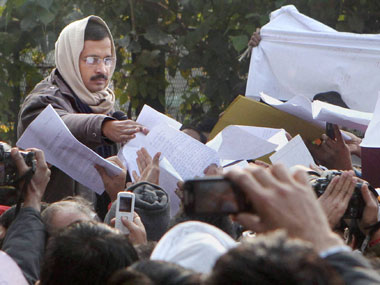Does the rising profile of the Aam Aadmi Party (AAP) pose a threat to a stock market recovery? And where should one invest, assuming AAP gains 20-30 seats in the Lok Sabha polls, raising the possibility of a hung government after May 2014? Or a weak coalition led by Congress or BJP?
Looking back to 2013, when politics was in as much of a flux as it could be in 2014, I would say the worries are overblown. Here are my predictions for the year for various asset categories based on AAP’s rise.
[caption id=“attachment_1334931” align=“alignleft” width=“380”]  Arvind Kejriwal. PTI[/caption]
Stocks: I believe 2014 is more likely to be a good year for Indian stocks for the following three reasons. One relates to a possible change in government and positive policy changes. These changes will continue no matter who comes to power. Even if AAP gains seats at the cost of BJP, it is unlikely that there will be a Third Front under AAP leadership, since the regional parties are as suspicious of AAP as the national parties. It is worth recalling that a Third Front government in 1996-98, under Deve Gowda and Ik Gujral, did not fail to push reforms even though it was unstable. Even the Congress-led UPA has pursued reforms over the last 18 months. So even if UPA-3 comes to power, the markets will have something to cheer. If the BJP comes to power, of course, the markets will be ecstatic. The only uncertain outcome is if neither Congress nor BJP is able to lead the next government. In that event, the stock market will face uncertainty - but the chances of this happening are relatively low, in my opinion.
Secondly, the stock market is yet to catch up with whatever growth we have seen over the last few years. The Sensex right now is exactly where it was six years ago. During these years, the economy has grown bigger by nearly 50 percent. This means stocks have to rise 50 percent some time of the other. 2014 is when it will start catching up with growth - as long as the elections don’t produce an absolutely horrible outcome where no government can be formed.
Thirdly, investment demand will start catching up for business has simply not invested enough for more than three or four years now. As the investment climate improves in 2014, stocks in the infrastructure, power, cement and steel sectors will start faring better. Banks too. For a reasonably risk-free strategy, I would invest in banks - especially public sector banks quoting at very low prices. Take Syndicate Bank. With a dividend yield of more than six percent, its current price of around Rs 94 is just over half its book value. I am not asking you to invest in Syndicate Bank, but just pointing out the attractive valuations prevailing.
Bonds: Bonds and fixed deposits did not do too well in 2013 because of high inflation, which forced the Reserve Bank to raise rates. When rates rise, bonds prices fall. Many bonds, including tax-free bonds, dropped in market value due to this. Will it be better next year? Probably. While rates will stay high till inflation comes down, I expect them to start falling after mid-2014. By the end of 2014, thus, I expect bond prices to start rising. My preference in 2014 is tax-free bonds, debt mutual funds, short-maturity funds, and - last - fixed deposits.
Real estate: Real estate will continue to stagnate, if not fall, next year because most property in urban areas is simply unaffordable. It will take salaries and jobs to revive strongly for several years for property prices to rise again. You should buy property only if you want to live in it and can afford today’s high prices.
Gold: The yellow metal has had a very bad year globally but not that bad a year in India, thanks to high import duties. Will 2014 be different? I doubt it. But gold should be a part of everyone’s portfolio, and I would certainly advice limited gold purchases in 2014, especially if prices fall.
Summary: Buy good stocks, tax-free bonds and some gold. Avoid property purchases except for living in it.
(Disclaimer: This is not an invitation to invest anywhere, but a reasoning for investment decision making. An earlier version of this article was published in Dainik Bhaskar)


)
)
)
)
)
)
)
)
)



